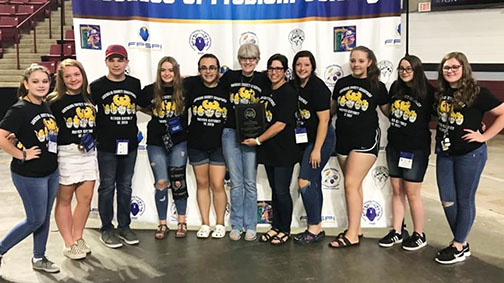
Electronic cigarette use doubled or nearly doubled in 6th-, 8th-, 10th- and 12th-grade students in 2018. One student-group in Johnson County is looking to take on this epidemic.
Photo by Amy Wallot, Oct. 29, 2010
- Electronic cigarette use doubled or nearly doubled in 6th-, 8th-, 10th- and 12th-grade students in 2018.
- A group of students in Johnson County are looking to take on this epidemic and have proposed legislation to counter the rising number of teens that have taken up vaping.
By Jacob Perkins
Jacob.perkins@education.ky.gov
E-cigs. E-vape. E-hookah. Electronic cigarettes may have many aliases, but it can’t hide from the alarming statistics.
According to the Kentucky Incentives for Prevention 2018 statewide trends report, electronic cigarette use doubled or nearly doubled in 6th-, 8th-, 10th- and 12th-grade students, the only grades that were included in the survey, from 2016 to 2018.
Electronic cigarettes originally were designed as an alternative for adult smokers, not for teens that have no history of tobacco use.
Elizabeth Hoagland, health promotion section supervisor for the Cabinet for Health and Family Services, said teens that begin using e-cigarettes run the risk of becoming addicted to nicotine, which can impair their memory and concentration. E-cigarettes also can prime the teen brain for other types of addiction, but that isn’t her only concern.
“E-cigarette aerosol contains ultrafine particles that can impact the cardiovascular system and chemicals such as diacetyl and acrylonitrile, which cause lung disease and cancer,” she said. “The FDA is currently following up on reports of seizures and lung disease in teens who use e-cigarettes.”
Hoagland says a key reason for the drastic increase of students using e-cigarettes is targeted marketing.
“Teens are attracted to the products through advertising,” she said. “The e-cigarette industry has a strong platform on social media where users are able to share content with their peers, creating a viral phenomenon.”
Hoagland added that the e-cigarette industry has created more than 15,000 flavors, many of which are fruit or candy flavored, which can be seen as a way to attract teens to use their products.
An obvious concern for any health professional when it comes to tobacco products is the nicotine levels. Robert Jackler, a Stanford University professor who studied the rise of e-cigarette use among teens, found that many generic e-cigarette companies are competing with the popular brand JUUL by increasing the levels of nicotine in their products. JUUL pods already contain 20 cigarettes worth of nicotine, according to Truth Initiative, America’s largest nonprofit public health organization dedicated to fighting the use of tobacco products.
This competition is worrisome to Hoagland because any nicotine use in teens can cause serious health concerns.
“Manufacturers are in a race to increase the nicotine content of their products, potentially making them even more addictive,” she said. “Nicotine addiction impairs memory and concentration, and can lead to irritability and moodiness. It is also understandably difficult for teens to focus on school work when they are craving a nicotine fix.”

The Juul Breakers from Johnson Central High School (Johnson County) pose for a picture. The group, which consists of, from left, Hannah Piedad, Laken Salyers, Cole Butcher, Alivia Hackworth, Constance Martin, Pam Burton, Brenda Dyer, Chloe Dyer, Emily Farler, Dakota Shepard and Kaylee Gibbs, came together for a class assignment. After seeing the effect that vaping was having on their classmates, they decided to try and make a change.
Photo submitted
A group of students in Johnson County are looking to take on this epidemic and even proposed legislation to counter the rising number of teens that have taken up vaping. The group, Juul Breakers, came together for a class assignment but after seeing the effect that vaping was having on their classmates, they decided to try and make a change.
“We have seen many of our friends get sick and have hard times because they get addicted to nicotine from vaping and it’s really hard for them to quit,” said Chloe Dyer – a Juul Breakers member and freshman at Johnson Central High School. “We see it and we don’t want it to happen anymore to our friends.”
The Juul Breakers assisted in the writing of Senate Bill 218 during the 2019 legislative session. The bill called for students that have been caught with tobacco products to be referred to cessation services. The bill also would have required the Kentucky Department of Education to instill an anonymous reporting system that students would be able to use to report incidents of tobacco use on their school’s property.
While SB 218 did not make it to Gov. Matt Bevin’s desk at the end of legislative session, another bill pertaining student tobacco use did. House Bill 11 was signed into law and it barred all tobacco products from Kentucky high school campuses. School districts have up to three years to opt out of the ban should they choose. The individual districts not opting out are able to set the penalties for violating the ban.
Alivia Hackworth, another member of Juul Breakers and a freshman at Johnson Central High School, feels that HB 11 can be seen as a good start, but the group plans to work with a legislator during the next legislative session to provide a more comprehensive approach to making healthier environments for Kentucky students.
“What are we going to do when we catch (students with tobacco)? Our bill provides a cessation class for kids that are caught to help them realize what’s happening to them,” she said.
The cessation classes, an integral part of the students’ proposed legislation, are designed to encourage students to stop their use of tobacco and prevent any future use. The group plans on working with a House member to get the legislation introduced during the next legislative session.
Hoagland said that it is important for parents to live a tobacco-free lifestyle and not provide mixed messages when discussing tobacco use with their children.
“Parents should set the expectation that young people do not use tobacco products,” she said. “Comments that everyone tries smoking at some point, or that it is OK to experiment, send mixed messages to young people.”
She also expressed the importance of providing accurate information to children about e-cigarette use. Information about e-cigarettes is available on the U.S. Centers for Disease Control and Prevention’s website and visit Quit Now Kentucky for help quitting tobacco.




Leave A Comment